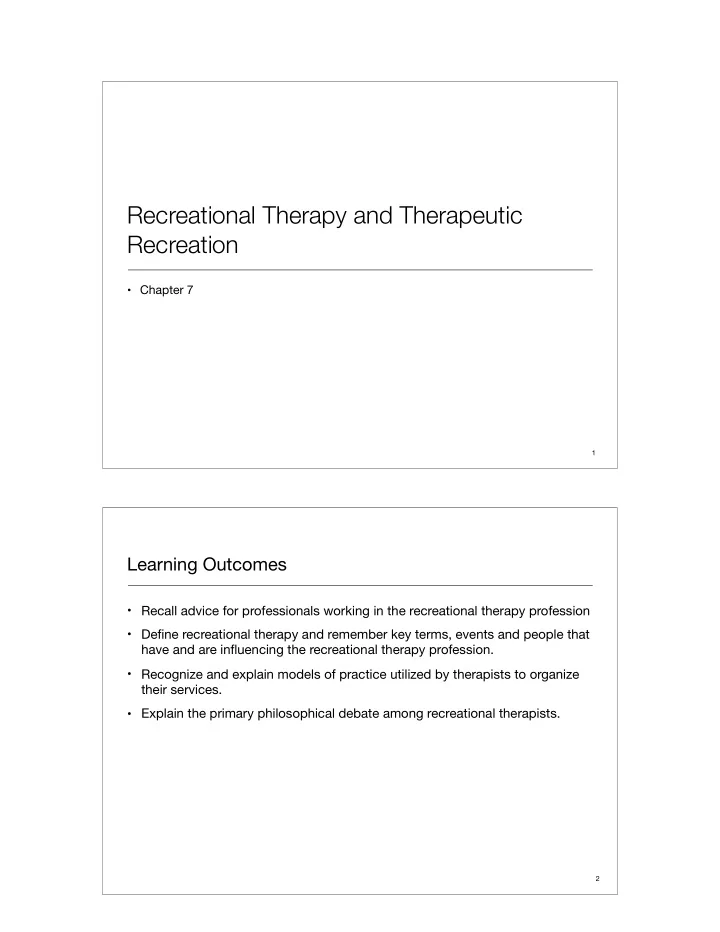

Recreational Therapy and Therapeutic Recreation • Chapter 7 1 Learning Outcomes • Recall advice for professionals working in the recreational therapy profession • Define recreational therapy and remember key terms, events and people that have and are influencing the recreational therapy profession. • Recognize and explain models of practice utilized by therapists to organize their services. • Explain the primary philosophical debate among recreational therapists. 2
Learning Outcomes cont. • Identify the most common types of disabilities and illnesses treated by recreational therapists, and recall the facts related to the passions, pay & perks, preparation and possibilities for three specific career settings: ‣ Recreational Therapy in Hospital Settings ‣ Recreational Therapy in Skilled Nursing Facilities ‣ Recreational Therapy in Community Settings • Summarize future opportunities and challenges facing recreational therapy professionals. • Evaluate how his or her preferences connect with career possibilities in recreational therapy, and if this is determined to be a primary career interest area. 3 What is Recreational Therapy? • “Recreational Therapy means a treatment service designed to restore, remediate and rehabilitate a person’s level of functioning and independence in life activities, to promote health and wellness as well as reduce or eliminate the activity limitations and restrictions to participation in life situations caused by an illness or disabling condition.” (ATRA, 2009) 4
A Brief History of Recreational Therapy as a Profession • The American Red Cross provided “hospital recreation” following WWI ‣ The Hospital Recreation Section of the American Recreation Society was established in 1949 • Two philosophical views have emerged ‣ Leisure focused, aligned with the National Therapeutic Recreation Society (NTRS) (est. 1966) ✦ Therapeutic Recreation Specialist (TRS) ‣ Versus clinical outcomes focused, aligned with the American Therapeutic Recreation Association (ATRA) (est. 1984) ✦ Recreational Therapist (RT) 5 Certification and Licensure • After years of diligent e ff orts to establish a national certification for recreational therapists the National Council for Therapeutic Recreation Certification (NCTRC) was established in 1981 • NCTRC serves as the gatekeeper of the profession by administering a certification exam to determine who is qualified to hold the Certified Therapeutic Recreation Specialist (CTRS) credential • In addition to the national credential, some states, including (North Carolina, New Hampshire, Utah, and Oklahoma), now require RTs to be licensed. 6
Where do TRSs and RTs work? • A wide variety of health care and community settings ‣ Acute care and rehabilitation hospitals serving individuals with physical and/or psychiatric disabilities ‣ Long-term care facilities ‣ Correctional facilities ‣ Schools ‣ Public recreation and parks departments 7 Four Models of Practice • Leisure Ability Model (Peterson and Gunn, 1984) • Health Protection/Health Promotion Model (Austin, 2004) • Recreation Service Model developed by burlingame (1998) modeled after the World Health Organization (WHO) model at the time • International Classification of Functioning, Disability, and Health (ICF) based on a new, comprehensive model developed by the WHO in 2001. ‣ The ICF model is strongly encouraged because it provides RTs with a common professional vocabulary and theoretical stance in their interactions with fellow health care professionals. 8
Career Areas in Recreational Therapy • Recreational Therapy in Hospital Settings • Recreational Therapy in Skilled Nursing Facilities • Recreational Therapy in Community Settings 9 RT in Hospital Settings • Passions: Medical environment, treatment teams with doctors, other allied health professionals (PT, Speech Therapy, and OT), social workers, and other health care providers • Pay and Perks: Carry full time benefits and health care insurance. Hospitals o ff er the best-paying jobs for recreational therapists • Preparation: CTRS and licensure; hands-on experience in health care settings • Possibilities: Frontline jobs available in many locations; may assume administrative duties with promotion 10
RT in Skilled Nursing Facilities • Passions: Working with older adults • Pay and Perks: Residents receive long-term service from practitioners so you have a chance to build relationships with clients • Preparation: CTRS and licensure; gain experience in skilled nursing facilities; gerontology coursework • Possibilities: With the population of older adults increasing, more RT’s will be needed 11 RT in Community Settings • Passions: Close relationships with clients, their families and communities • Pays & Perks: Varies widely depending on size and nature of employment; a lot of variety; advocacy • Preparation: CTRS and licensure; must have a wide range of recreation knowledge and skills related to sports, arts and crafts, and games • Possibilities: Opportunities for persons with disabilities are expanding and RTs are needed to conduct services in recreation and parks departments, out-of-school time programs, and any agency providing adaptive programs 12
Future Opportunities, Issues, and Challenges • On-going debate about the essential nature of RT • A need to improve insurance coverage for services (including public insurance such as Medicaid and Medicare) • Continued development of the body of knowledge for this relatively young profession to establish a sound foundation of evidence-based practice • More systematic adherence to standards of practice and the development of, and adherence to, standard treatment protocols is needed. 13 In Review • According to the NCTRC, which of the following is considered as one of the two most common settings for recreational therapy employment? ‣ Hospital ‣ Prison ‣ Public parks and recreation department ‣ School 14
In Review • Which piece of legislation mentioned in your chapter is a comprehensive civil rights law designed to protect the rights of people with disabilities? ‣ Americans with Disabilities Act ‣ Inclusion Act ‣ Individuals with Disabilities Education Act (IDEA) ‣ Rehabilitation Act 15 In Review • Which of the following is widely-recognized as the first model of practice in recreational therapy? ‣ Health Protection/Health Promotion Model ‣ ICF Model ‣ Leisure Ability Model ‣ Recreation Service Model 16
In Review • Professional organizations in recreation therapy date back to: ‣ 1910 ‣ 1949 ‣ 1984 ‣ 1990 17
Recommend
More recommend